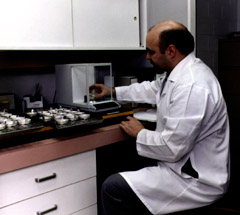 |
As a Food Chemistry Quality Assurance Coordinator, Stephen, 38,
makes sure that the labís instruments are properly calibrated
so they give accurate results. He also develops standards and
procedures for conducting experiments, ensures that lab technicians
are accurately recording results, and audits the results of experiments
to ensure the procedures are correctly followed. In addition,
Stephen helps to develop and test new laboratory methods, as well
as to run analyses on various samples. Working hands-on in the
lab is one of the most exciting parts of his job, Stephen says.
Very often, companies ask the Food Technology Centre to prepare
a nutritional analysis of a food sample. The results - listing
calories per portion, vitamins and minerals, fat content, etc.
- are then listed on the package. Itís part of Stephenís job to
set up and run such experiments.
Stephen is
also currently helping to develop a new method to help researchers
test water for pesticides. He is using a special material and
a new set-up that may eventually allow researchers to test for
pesticides directly from the suspect stream of water. "Itís the
problem-solving that makes my job so exciting," Stephen says.
"Even when youíre tracking down an error, thereís a certain joy
involved. And there has been a real attitude shift. People used
to hide their mistakes, but now they are coming forward and saying
when something isnít working. It makes the job easier."
|
 |


